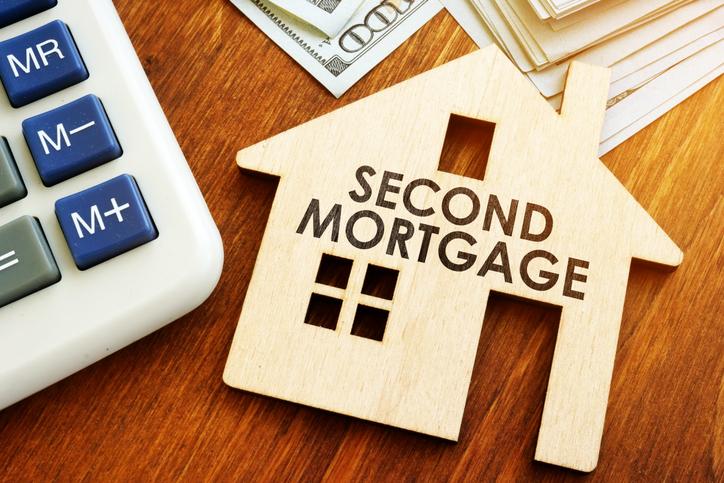Taking out a second mortgage on your primary residence can provide you with cash that you could use to buy an investment property. Qualifying for a second mortgage is not a given, however. It requires careful preparation and a strong financial profile. Lenders typically look for a solid credit score, a low debt-to-income ratio and sufficient equity in your current home before approving a second mortgage. To apply, you’ll need detailed financial documentation, such as tax returns, pay stubs and bank statements, to demonstrate your ability to manage additional debt. It helps to have a clear investment plan for the real estate you wish to purchase, as lenders may consider the potential income and appreciation of the property.
If you want to buy a home, a financial advisor can work with you to create a plan.
Understanding Second Mortgages
A second mortgage is a loan taken out against a property that already has a mortgage. The existing mortgage remains the primary lien, while the second mortgage becomes a secondary lien. Homeowners can use a second mortgage to turn equity into cash they can deploy for various purposes, including investing in real estate.
A second mortgage is a type of home equity loan that generally features a fixed interest rate that supplies you with a lump sum of loan proceeds. The similar home equity line of credit (HELOC) also allows borrowing against home equity but typically offers a revolving credit line instead of a lump-sum loan.
Lenders generally require borrowers to have substantial equity in their primary residence before approving a second mortgage. To determine your equity, subtract your outstanding mortgage balance from your home’s current market value. Generally, lenders prefer borrowers with at least 20% equity, although some may accept less depending on other factors. If you have more equity, you are likely to be able to borrow more and may get a better interest rate and improved loan terms.
Qualifying for a Second Mortgage

Understanding the lender’s expectations is the first place to start if you hope to obtain a second mortgage to invest in real estate. To succeed, you’ll have to meet these seven general requirements:
- Credit score: Most lenders require a minimum credit score of 620, but having a score above 700 can increase your chances of approval and secure better interest rates. A higher credit score demonstrates financial responsibility and reduces perceived risk for lenders.
- Debt-to-income ratio (DTI): Lenders generally prefer a DTI ratio below 43%, which means your monthly debt obligations, including your new mortgage payment, should not exceed 43% of your gross monthly income. This ratio assures lenders that you can handle the additional financial burden of a second mortgage.
- Home equity: You will likely need at least 20% equity in your primary residence. Equity is the difference between your home’s current market value and the remaining balance on your mortgage. More equity can result in better loan terms, as it serves as collateral for the lender.
- Income verification: Proof of stable income is crucial. Lenders typically require recent pay stubs, tax returns and bank statements to ensure you have a consistent income stream to cover your new mortgage payments.
- Investment property plan: A clear plan for your investment property can strengthen your application. Lenders may want to see how you expect to generate rental income or increase property value. Having an organized, written description of your approach to marketing and managing the property will help to demonstrate that you can make the investment pay for itself.
- Property appraisal: A professional appraisal of your current home may be required to verify its market value. This step assures the lender of the property’s worth and, crucially, helps determine how much money you will be able to borrow.
- Cash reserves: Having cash reserves that can cover several months of mortgage payments can enhance your application. This reserve demonstrates financial stability and provides a safety net in case of unexpected financial challenges.
Special Considerations
Lenders often allow you to incorporate the expected income from the new investment property when evaluating your application for a second mortgage. This projected rental income can play a significant role in determining your eligibility and loan terms.
Lenders may consider a portion of the expected rental income as part of your total income, which can help improve your debt-to-income ratio. Typically, lenders use a percentage of the potential rental income, often 75%, to account for vacancies and maintenance costs.
With the potential for higher income, lenders might be willing to offer a larger loan amount, enabling you to invest in a more valuable property or cover additional expenses related to the investment.
Applying for Second Mortgage to Invest in Real Estate
If you’re interested in getting a second mortgage to invest in real estate, here’s a closer look at each step in the process:
- Assess your financial situation: Start by evaluating your credit score, debt-to-income (DTI) ratio, and equity in your current home. Ensure your credit score meets or exceeds the lender’s minimum requirements and that your DTI is below 43%. Having at least 20% equity in your home will likely be necessary.
- Research lenders: Explore different lenders and compare their interest rates, terms and eligibility requirements. Look for lenders with experience in second mortgages for investment properties.
- Gather required documentation: Collect pay stubs, tax returns, bank statements and any other financial documents the lender may require. Preparing these in advance can streamline the application process.
- Submit application: Complete the lender’s application form, providing all necessary information and documentation. Be ready to discuss your investment plan for the property.
- Property appraisal: Allow the lender to appraise your current home to determine its market value and available equity.
- Underwriting and approval: The lender will review your application and financial details. If approved, you’ll receive the loan terms and conditions.
- Closing: Be prepared to pay closing costs. Review and sign the loan agreement. After you close, you’ll be able to access the funds for your real estate investment.
Bottom Line

Obtaining a second mortgage for real estate investment can let you leverage your home’s equity to generate income and build your wealth. By understanding the requirements and steps involved, such as maintaining a strong credit profile, evaluating your financial situation and presenting a clear investment plan, you can position yourself for success. Navigating the process carefully and choosing the right lender can open up opportunities to diversify your investment portfolio and achieve your financial goals.
Tips to Buy a Home
- A financial advisor can help you create a financial plan to buy a home. Finding a financial advisor doesn’t have to be hard. SmartAsset’s free tool matches you with up to three vetted financial advisors who serve your area, and you can have a free introductory call with your advisor matches to decide which one you feel is right for you. If you’re ready to find an advisor who can help you achieve your financial goals, get started now.
- Want to figure out how much you’ll have to pay each month on a property you want to buy? SmartAsset’s mortgage calculator can help you get an estimate.
Photo credit: ©iStock.com/designer491, ©iStock.com/damircudic, ©iStock.com/Mateja Sekulic
